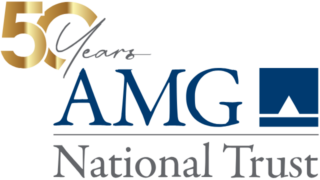End of Life Planning: Are You Good to Go?
• 13 min read

Get the Latest Research & Insights
Sign up to receive an email summary of new articles posted to AMG Research & Insights.

We all procrastinate. With family and career, there can be so much going on today that it is overwhelming to think about tomorrow. Besides, it’s common to push difficult discussions off to another day. An estate or end-of life plan is often one of those discussions, as many Americans also don’t have a will or living trust.
Pushing it off may give a false sense of security since you aren’t facing those difficult discussions in the present, but serious illness and tragedy can strike without warning. We don’t always have tomorrow.
If there can be a silver lining in any serious health event, it’s that it is often a catalyst for action—and COVID-19 was no different. Since the pandemic, young adults are 50% more likely to have begun estate planning.
Based on decades of conversations with AMG clients, we’ve found that the fear of bringing up the topic of life after our passing is much worse than the reality of tackling it. In fact, many find that end-of-life planning eases their burden heading into illness or old age.
If you have property, investments, or anything of value, you need an estate plan.
If you have family or dependents, you need an estate plan.
WHAT IS ESTATE PLANNING?
Some mistakenly believe a will is the same as an estate plan and that you’re done once a will is created. A will is typically only one document within an estate plan, dictating where your assets will go after you die.
An estate plan, on the other hand, provides overall guidance for your loved ones on how you want your financial affairs and medical care to be handled if you become incapacitated or die. If you have a spouse, minor children, or family members with special needs, your plan should provide for their care and financial support. You can also minimize estate taxes and provide for a fast, orderly distribution of your assets.
You don’t have to handle estate planning on your own–in fact, you shouldn’t. While you can find a lot of information and fill-in-the-blank estate planning forms online, trying to save a few hundred dollars in upfront costs can end up costing your heirs thousands later on.
Most states have very specific requirements that must be met for your will and other estate planning documents to be valid. If these requirements aren’t met, such as if the language isn’t correct or the wording is imprecise, your instructions could be disregarded and your affairs could instead be handled according to state law.
At AMG, we help clients create a fully customized financial plan that will work for them today and into the future as their life circumstances change.
ESSENTIAL ELEMENTS OF YOUR PLAN
In our experience, these are some of the subjects within estate planning that help create financial peace of mind:
- An estate organizer
- Durable power of attorney and living will
- Letter of instruction (legacy planning)
- Do-not-resuscitate order (DNR)
- Disposition of remains
- Guard against identity theft
Additionally, if you have children:
- Protect your children
- Choose guardians
- Consider a living trust
- Account for estate tax obligations
Estate organizer
Being organized is the foundation of a successful estate plan. A comprehensive list of your financial accounts, key documents, professional advisors and medical providers—with contact information for all—will be invaluable to your survivors. We’ve created a convenient organizer for this purpose (click here to view).
Create an inventory of your financial assets (both tangible and intangible), liabilities, and recurring obligations. Devote particular attention to your bills that must be paid regularly. This list is vital not only on a practical level but also for emotional well-being: Bill paying is frequently cited as one of the top stressors for surviving spouses.
Try to collect all important documents in binders, with a table of contents, to keep track of what you already have and what’s left to do. If some documents are kept outside the organizer, such as in a safety deposit box, provide the location and contact information.
What exactly is an important document?
- Estate-related. Advance health care directive; do not resuscitate order; powers of attorney; will; trust(s); funeral arrangements
- Family-related. Birth certificates; adoption papers; military records; marriage license; family photos; Social Security cards
- Property-related. Deeds; mortgage papers; titles to vehicles; homeowner insurance policies
- Financial-related. Sources of income and assets (pension from your employer, IRAs, 401(k)s, interest, etc.); Social Security and Medicare/Medicaid information; insurance information (life, health, long-term care, home, car) with policy numbers and agents’ names and phone numbers; names of your banks and account numbers (checking, savings, credit union); investment income (stocks, bonds, property) and brokers’ names and phone numbers; a copy of your most recent income tax return
- Digital organizer. Your survivors will appreciate a list of your online accounts and digital property in one handy document that includes web addresses and login information. We’ve created a convenient form for this purpose (click here to view).
Consider using a password manager app to organize and safeguard your usernames and passwords. These apps can consolidate access information for the too-many-to-remember sites you use, automatically log you in and electronically secure credentials against hackers. Especially for social media sites, consider designating how your online presence should be managed or memorialized after your death, and by whom.
Most important, tell loved ones where to find the binder.
Durable power of attorney and living will
A power of attorney (POA) authorizes someone else to handle certain matters, such as finances or health care, on your behalf. If a power of attorney is durable, it remains in effect if you become incapacitated, such as due to illness or an accident. Durable powers of attorney help you plan for medical emergencies and declines in mental functioning and can ensure that your finances are taken care of.
Another element is a living will (also known as an advance health care directive) that states your wishes for end of life care. Be aware that states will likely have specific requirements for living wills and rules governing when they take effect.
Having these documents in place helps eliminate confusion and uncertainty when family members need to make decisions on life sustaining treatment. Doing so also can clearly halt situations where loved ones are at odds over your care. The National Institute on Aging provides free publications that can help you and loved ones discuss key issues around life wishes.
Letter of instruction (legacy planning)
While a will focuses on what you want to go to whom, a letter of instruction can explain why you want someone to have something. For instance, rather than simply providing money for an education, you instead explain that you want a loved one to fulfill their dream of being a musician. Unlike a will, this letter has no legal authority. Think of it as legacy planning—passing your values to others. You also can explain how important personal possessions or family heirlooms, such as jewelry, artwork, and collectibles, are to be gifted. Each piece may tell an important story of your family’s history that you would like to be preserved (and not sold off at an estate sale). Otherwise, these stories might be lost forever.
Do-not-resuscitate order (DNR)
A DNR indicates that you don’t want to receive cardiopulmonary resuscitation if your heart stops beating, and it sometimes prevents other medical interventions as well. There is a DNR for when you are in the hospital and another if something were to happen to you while not in the hospital. Most commonly, a physician decides whether to implement the DNR based on a combination of medical judgment and your expressed wishes.
Disposition of remains
This document is a comprehensive set of instructions for the treatment of your remains upon death (e.g., burial, cremation, composting, water cremation, organ donation, medical research). It gives you the opportunity to describe in detail the funeral and burial arrangements you desire or already have made and to name and give contact information for your doctor, local coroner, and other relevant service providers.
You may wish to include a final letter to loved ones or draft an obituary.
Finally, can you even afford to die in your state? Funeral costs can add up fast and vary by state.
Guard against identity theft
While the digital age has brought incredible technological innovations and benefits, it also has enabled huge growth in a particularly personal kind of crime: identity theft. An obituary may include a trove of personal information that a thief can use to establish new accounts or lines of credit in the deceased’s name. But you can fight back.
Designate someone to do the following after your death:
- Notify credit reporting agencies.
- Close your credit cards. In your estate organizer, you should provide a recovery phone number or email address for two-factor identification so your designated legacy contact can access the accounts.
- Cancel your driver’s license.
- Notify the post office and cancel any subscriptions if no one will be at your home.
Protect your children
Your choices now can help your children better navigate that uncertain future. Consider the distribution of your assets to your children. In the absence of direction from you, your children may inherit your estate in one lump sum when they reach the age of majority, which is 18 in most states. Consider the challenge you may be creating for your 18-year-old child by suddenly making them handle significant sums of money without guidance or guardrails.
Choose guardians
You should also name a guardian for your children—and a backup guardian, just in case. This can help sidestep costly family court fights that could drain your estate’s assets.
An advisor working with you can help ensure you have enough life insurance, based on whether you’re married or have dependent children.
Consider revocable living trust
A revocable living trust (or living trust) is a written legal document through which your assets are placed into trust, typically for your benefit during your lifetime, and then transferred to designated beneficiaries at your death by your chosen representative. It is one of several types of trusts and is flexible in that it can be terminated or amended by the grantor during their lifetime.
One of the main benefits of revocable living trusts is that property contained within them can potentially avoid probate and instead pass directly to beneficiaries. This can mean a savings of both time and money for your loved ones.
Additionally, an insurance company may not distribute proceeds from a policy directly to minor children. The assets would likely be managed by some sort of custodian until the minor reaches the age of majority. Alternatively, proceeds may be distributed directly to a trust which names the minor child as the beneficiary. It might also be possible to designate your death benefit for uses that benefit your minor child. Legal and financial advisors can help you determine the best choice for your family.
A common reason for not planning ahead is thinking that all assets will go to a spouse tax-free anyway. This faulty logic does not account for a situation where the spouse is no longer alive or able to accept property, nor does it protect your assets for other heirs and beneficiaries. A living trust can also shield your children’s inheritance should your spouse remarry after your death.
Estate tax obligations
Although you’ve probably heard dire statements about the estate tax, the truth is that the vast majority of estates will not owe any federal estate tax. In 2025, the federal estate tax exemption is $13.99 million for an individual or $27.98 million for a married couple.
Still, if you are anywhere near this number, you should have your bases covered. Find out whether your state has death or inheritance taxes that might affect your estate; some states have a lower threshold amount than for federal estate taxes.
WITH AN ESTATE PLAN, YOU’RE NEVER REALLY DONE
Revisit your estate plan periodically to account for life-changing events, such as marriage or divorce, the birth of a child or a job change. Even if your circumstances remain the same, laws may have changed. Revising your plan will require time and perhaps some painful conversations but take heart that in doing so you have already avoided the biggest estate planning mistake: never drafting a plan at all.
HOW AMG CAN HELP
Easing the burden for your loved ones by creating, implementing, and updating a cohesive estate plan can be complicated: It requires highly specialized knowledge and capabilities, and everyone’s values and circumstances are different. But the conversations will help you find peace of mind in knowing that your affairs will be taken care of as you wish.
AMG is a trusted resource for many families, especially those with complicated financial lives. We’re here to help so that you will be able to relax and enjoy every one of your remaining moments.
To find out more about AMG’s Personal Financial Management (PFM) or to book a free consultation call 303-486-1475 or email us the best day and time to reach you.
REQUEST REPORT
Download this free 7-page report for key steps to consider in your end-of-life planning.
Frequently Asked Questions
Make an estate plan that is structured to express your values and wishes, such as funding education for children and grandchildren. An estimated 70% of generational wealth doesn’t make it past the second generation, and 90% disappears by the third.
If a bank account has no joint owner or designated beneficiary, it will likely have to go through a probate process. The account funds may then be distributed—after all creditors of the estate are paid off—according to the terms of the will, if there is one.
Generally you cannot withdraw deposits from an open account of someone who has died unless you were named on the account before the person’s death and potentially granted an order of probate from a court of competent jurisdiction.
The deceased person’s estate is responsible for paying any unpaid debts. If there are no assets left, then the debt may not be paid.
This information is for general information use only. It is not tailored to any specific situation, is not intended to be investment, tax, financial, legal, or other advice and should not be relied on as such. AMG’s opinions are subject to change without notice, and this report may not be updated to reflect changes in opinion. Forecasts, estimates, and certain other information contained herein are based on proprietary research and should not be considered investment advice or a recommendation to buy, sell or hold any particular security, strategy, or investment product.
Get the latest in Research & Insights
Sign up to receive a weekly email summary of new articles posted to AMG Research & Insights.






